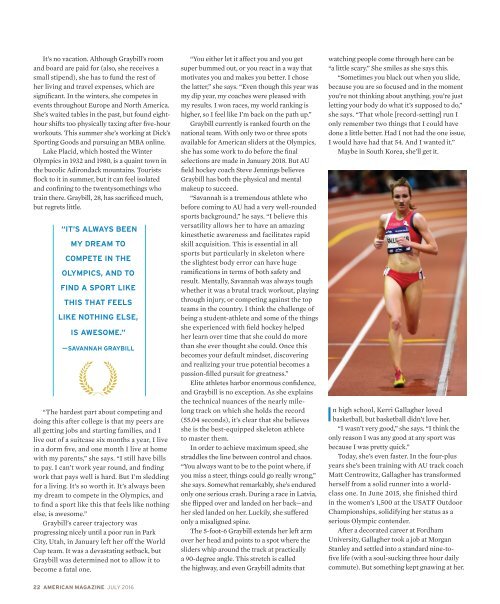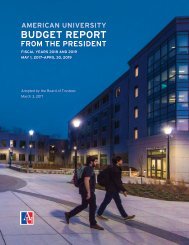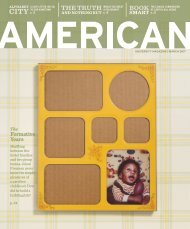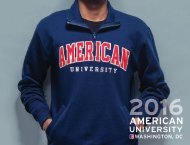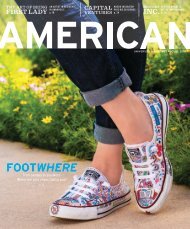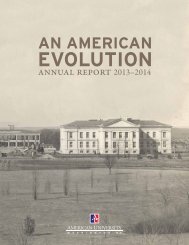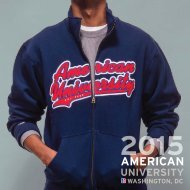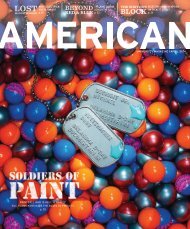American magazine, July 2016
In this issue explore DC street art, run away with the Street Light Circus, meet AU’s Olympic hopefuls, reminisce about commencements past, hop on the Metro to the Smithsonian, and get to know some of AU’s 1,875 Boston transplants. Also in the July issue: 3 minutes on the national parks, 88 years of yearbooks, and a beer quiz.
In this issue explore DC street art, run away with the Street Light Circus, meet AU’s Olympic hopefuls, reminisce about commencements past, hop on the Metro to the Smithsonian, and get to know some of AU’s 1,875 Boston transplants. Also in the July issue: 3 minutes on the national parks, 88 years of yearbooks, and a beer quiz.
You also want an ePaper? Increase the reach of your titles
YUMPU automatically turns print PDFs into web optimized ePapers that Google loves.
It’s no vacation. Although Graybill’s room<br />
and board are paid for (also, she receives a<br />
small stipend), she has to fund the rest of<br />
her living and travel expenses, which are<br />
significant. In the winters, she competes in<br />
events throughout Europe and North America.<br />
She’s waited tables in the past, but found eighthour<br />
shifts too physically taxing after five-hour<br />
workouts. This summer she’s working at Dick’s<br />
Sporting Goods and pursuing an MBA online.<br />
Lake Placid, which hosted the Winter<br />
Olympics in 1932 and 1980, is a quaint town in<br />
the bucolic Adirondack mountains. Tourists<br />
flock to it in summer, but it can feel isolated<br />
and confining to the twentysomethings who<br />
train there. Graybill, 28, has sacrificed much,<br />
but regrets little.<br />
“IT’S ALWAYS BEEN<br />
MY DREAM TO<br />
COMPETE IN THE<br />
OLYMPICS, AND TO<br />
FIND A SPORT LIKE<br />
THIS THAT FEELS<br />
LIKE NOTHING ELSE,<br />
IS AWESOME.”<br />
—SAVANNAH GRAYBILL<br />
“The hardest part about competing and<br />
doing this after college is that my peers are<br />
all getting jobs and starting families, and I<br />
live out of a suitcase six months a year, I live<br />
in a dorm five, and one month I live at home<br />
with my parents,” she says. “I still have bills<br />
to pay. I can’t work year round, and finding<br />
work that pays well is hard. But I’m sledding<br />
for a living. It’s so worth it. It’s always been<br />
my dream to compete in the Olympics, and<br />
to find a sport like this that feels like nothing<br />
else, is awesome.”<br />
Graybill’s career trajectory was<br />
progressing nicely until a poor run in Park<br />
City, Utah, in January left her off the World<br />
Cup team. It was a devastating setback, but<br />
Graybill was determined not to allow it to<br />
become a fatal one.<br />
“You either let it affect you and you get<br />
super bummed out, or you react in a way that<br />
motivates you and makes you better. I chose<br />
the latter,” she says. “Even though this year was<br />
my dip year, my coaches were pleased with<br />
my results. I won races, my world ranking is<br />
higher, so I feel like I’m back on the path up.”<br />
Graybill currently is ranked fourth on the<br />
national team. With only two or three spots<br />
available for <strong>American</strong> sliders at the Olympics,<br />
she has some work to do before the final<br />
selections are made in January 2018. But AU<br />
field hockey coach Steve Jennings believes<br />
Graybill has both the physical and mental<br />
makeup to succeed.<br />
“Savannah is a tremendous athlete who<br />
before coming to AU had a very well-rounded<br />
sports background,” he says. “I believe this<br />
versatility allows her to have an amazing<br />
kinesthetic awareness and facilitates rapid<br />
skill acquisition. This is essential in all<br />
sports but particularly in skeleton where<br />
the slightest body error can have huge<br />
ramifications in terms of both safety and<br />
result. Mentally, Savannah was always tough<br />
whether it was a brutal track workout, playing<br />
through injury, or competing against the top<br />
teams in the country. I think the challenge of<br />
being a student-athlete and some of the things<br />
she experienced with field hockey helped<br />
her learn over time that she could do more<br />
than she ever thought she could. Once this<br />
becomes your default mindset, discovering<br />
and realizing your true potential becomes a<br />
passion-filled pursuit for greatness.”<br />
Elite athletes harbor enormous confidence,<br />
and Graybill is no exception. As she explains<br />
the technical nuances of the nearly milelong<br />
track on which she holds the record<br />
(55.04 seconds), it’s clear that she believes<br />
she is the best-equipped skeleton athlete<br />
to master them.<br />
In order to achieve maximum speed, she<br />
straddles the line between control and chaos.<br />
“You always want to be to the point where, if<br />
you miss a steer, things could go really wrong,”<br />
she says. Somewhat remarkably, she’s endured<br />
only one serious crash. During a race in Latvia,<br />
she flipped over and landed on her back—and<br />
her sled landed on her. Luckily, she suffered<br />
only a misaligned spine.<br />
The 5-foot-6 Graybill extends her left arm<br />
over her head and points to a spot where the<br />
sliders whip around the track at practically<br />
a 90-degree angle. This stretch is called<br />
the highway, and even Graybill admits that<br />
watching people come through here can be<br />
“a little scary.” She smiles as she says this.<br />
“Sometimes you black out when you slide,<br />
because you are so focused and in the moment<br />
you’re not thinking about anything, you’re just<br />
letting your body do what it’s supposed to do,”<br />
she says. “That whole [record-setting] run I<br />
only remember two things that I could have<br />
done a little better. Had I not had the one issue,<br />
I would have had that 54. And I wanted it.”<br />
Maybe in South Korea, she’ll get it.<br />
In high school, Kerri Gallagher loved<br />
basketball, but basketball didn’t love her.<br />
“I wasn’t very good,” she says. “I think the<br />
only reason I was any good at any sport was<br />
because I was pretty quick.”<br />
Today, she’s even faster. In the four-plus<br />
years she’s been training with AU track coach<br />
Matt Centrowitz, Gallagher has transformed<br />
herself from a solid runner into a worldclass<br />
one. In June 2015, she finished third<br />
in the women’s 1,500 at the USATF Outdoor<br />
Championships, solidifying her status as a<br />
serious Olympic contender.<br />
After a decorated career at Fordham<br />
University, Gallagher took a job at Morgan<br />
Stanley and settled into a standard nine-tofive<br />
life (with a soul-sucking three hour daily<br />
commute). But something kept gnawing at her.<br />
22 AMERICAN MAGAZINE JULY <strong>2016</strong>


